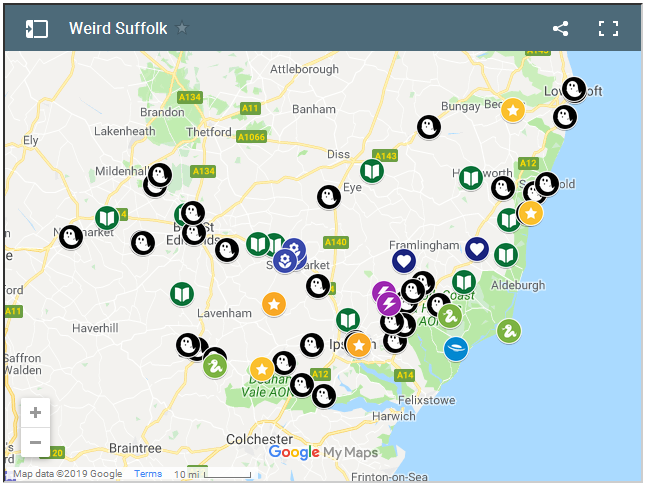nivek
As Above So Below
Weird Suffolk: Malekin of Dagworth
According to legend, a changeling is when a fairy child is left in a human child’s place while the human is whisked away to a different land.
Dagworth Hall was a medieval hall with a colourful history which can be traced back to the Domesday Book of 1086 and whose first resident was a Saxon farmer called Breme - but the ancient house was famous for an occupant whose trade was far more mischievous, a magical child who claimed to be human but who everyone believed to be a changeling.
In the 1190s, around 30 years after the Wildman of Orford had been chained in a castle on the Suffolk coast, the manor was home to a judge and knight called Osbert Fitzhervey, who lived there with his family, servants and…a fairy child, Malekin.
When Malekin first arrived at Dagworth, Osbert and his family were alarmed: they believed that an invisible, magical spirit had invaded their home and was playing pranks on them and whispering in a childish voice. But it didn’t take long for Malekin to weave a spell over the family.
They quickly became enchanted with Malekin and began to share their secrets with him and leave food out on a special chest for him – he charmed the whole household by holding conversations with the castle’s servants and discussing scriptures with the priests in Latin.

Malekin claimed not to be a changeling, but rather a human child who had been born in nearby Lavenham and stolen from a field from where his mother had been working. He said that he had been in his present form for seven years and that in a further seven years, he would be restored to living with people.
He told his adopted family that he and others like him wore special hats which made them invisible: only once did he remove his hat and reveal himself to a maid at the castle to whom he appeared as a very small child wearing a white tunic.
An account of the strange visitation is given by Ralph of Coggeshall, a monk in the Cistercian abbey of Coggeshall in Essex. In an account written for the abbey, he wrote: “In the time of King Richard [1189-99], there appeared frequently, and for a long space of time, in the house of Sir Osberni de Bradewelle, at Daghewurthe in Suffolk, a certain fantastical spirit who conversed with the family of the aforesaid knight, always imitating the voice of a one-year-old child.
“He called himself Malekin, and he said that his mother and brother dwelt in a neighbouring house, and that they often chided him because he left them and went to speak with people. The things which he did and said were both wonderful and very funny and he often told people’s secrets. At first the family of the knight were extremely terrified, but by degrees they became used to his words and silly actions, and conversed familiarly with him.”
The fact that Malekin was an addition to the family, rather than a swap for a human child, marks him out as something very different to a traditional changeling from folklore: some experts believe that the spirit who visited Dagworth Hall was, in fact, a poltergeist.
Alan Murdie from the Society for Psychical Research said the story contained an adolescent focus, mischievous behaviour “…and the disappearance of objects, and complaints of the presumed haunting presence being heard and physically felt but never seen (except on one occasion). With respect to the voice, could this have been an example of the rare Enfield-variety of speaking poltergeist? “
He added that in 2000, he had received a letter from the late Major Patrick de Vere Patey of Dagworth near Stowmarket concerning some unusual ghostly experiences which had happened to his family and in passing, he mentioned a haunting at Dagworth Hall which occurred in the 1960s.
“One other curious event in Dagworth was that in the 1960s a school inspector moved into the old part of the former Dagworth Hall only to leave pretty sharply due to what must have been the action of a Poltergeist behaving in the traditional manner. Mrs Whitted who rented that part of the house after him, never had any trouble,” said the Major.
In further correspondence, he added: “I never met the School Inspector only knowing that he left in some haste.”
It should be noted that one half of Weird Suffolk has a name which translates in Irish as “elvish or changeling child”, deriving from Siobhra, meaning fairy or fairies – an older form is Siabhra, which means one who is prone to evil and mischief: Siofra refuses to confirm or deny whether she is a changeling, but she definitely makes mischief.
.
